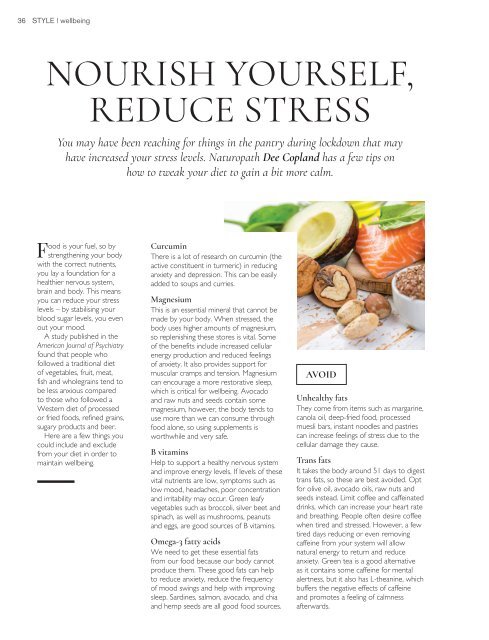Style: May 20, 2020
You also want an ePaper? Increase the reach of your titles
YUMPU automatically turns print PDFs into web optimized ePapers that Google loves.
36 STYLE | wellbeing<br />
NOURISH YOURSELF,<br />
REDUCE STRESS<br />
You may have been reaching for things in the pantry during lockdown that may<br />
have increased your stress levels. Naturopath Dee Copland has a few tips on<br />
how to tweak your diet to gain a bit more calm.<br />
Food is your fuel, so by<br />
strengthening your body<br />
with the correct nutrients,<br />
you lay a foundation for a<br />
healthier nervous system,<br />
brain and body. This means<br />
you can reduce your stress<br />
levels – by stabilising your<br />
blood sugar levels, you even<br />
out your mood.<br />
A study published in the<br />
American Journal of Psychiatry<br />
found that people who<br />
followed a traditional diet<br />
of vegetables, fruit, meat,<br />
fish and wholegrains tend to<br />
be less anxious compared<br />
to those who followed a<br />
Western diet of processed<br />
or fried foods, refined grains,<br />
sugary products and beer.<br />
Here are a few things you<br />
could include and exclude<br />
from your diet in order to<br />
maintain wellbeing.<br />
Curcumin<br />
There is a lot of research on curcumin (the<br />
active constituent in turmeric) in reducing<br />
anxiety and depression. This can be easily<br />
added to soups and curries.<br />
Magnesium<br />
This is an essential mineral that cannot be<br />
made by your body. When stressed, the<br />
body uses higher amounts of magnesium,<br />
so replenishing these stores is vital. Some<br />
of the benefits include increased cellular<br />
energy production and reduced feelings<br />
of anxiety. It also provides support for<br />
muscular cramps and tension. Magnesium<br />
can encourage a more restorative sleep,<br />
which is critical for wellbeing. Avocado<br />
and raw nuts and seeds contain some<br />
magnesium, however, the body tends to<br />
use more than we can consume through<br />
food alone, so using supplements is<br />
worthwhile and very safe.<br />
B vitamins<br />
Help to support a healthy nervous system<br />
and improve energy levels. If levels of these<br />
vital nutrients are low, symptoms such as<br />
low mood, headaches, poor concentration<br />
and irritability may occur. Green leafy<br />
vegetables such as broccoli, silver beet and<br />
spinach, as well as mushrooms, peanuts<br />
and eggs, are good sources of B vitamins.<br />
Omega-3 fatty acids<br />
We need to get these essential fats<br />
from our food because our body cannot<br />
produce them. These good fats can help<br />
to reduce anxiety, reduce the frequency<br />
of mood swings and help with improving<br />
sleep. Sardines, salmon, avocado, and chia<br />
and hemp seeds are all good food sources.<br />
AVOID<br />
Unhealthy fats<br />
They come from items such as margarine,<br />
canola oil, deep-fried food, processed<br />
muesli bars, instant noodles and pastries<br />
can increase feelings of stress due to the<br />
cellular damage they cause.<br />
Trans fats<br />
It takes the body around 51 days to digest<br />
trans fats, so these are best avoided. Opt<br />
for olive oil, avocado oils, raw nuts and<br />
seeds instead. Limit coffee and caffeinated<br />
drinks, which can increase your heart rate<br />
and breathing. People often desire coffee<br />
when tired and stressed. However, a few<br />
tired days reducing or even removing<br />
caffeine from your system will allow<br />
natural energy to return and reduce<br />
anxiety. Green tea is a good alternative<br />
as it contains some caffeine for mental<br />
alertness, but it also has L-theanine, which<br />
buffers the negative effects of caffeine<br />
and promotes a feeling of calmness<br />
afterwards.


















